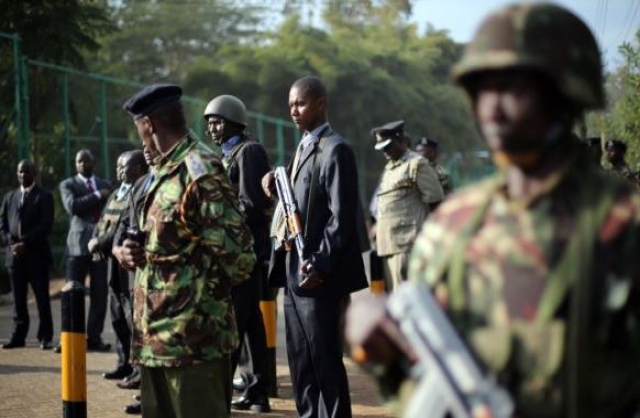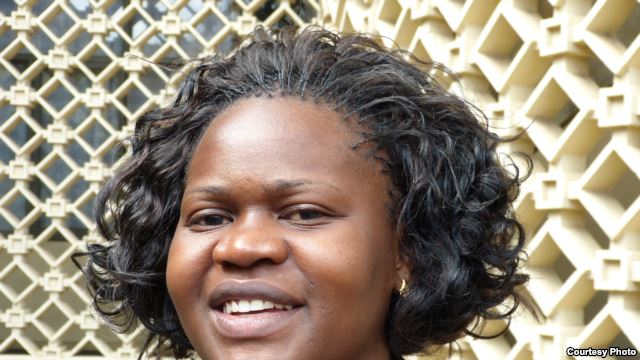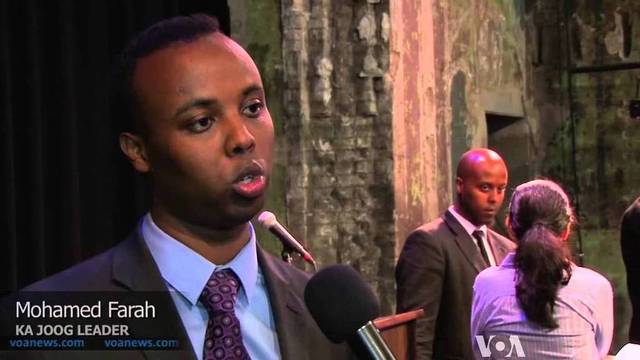 Kenyan security forces line up behind Interior Minister Joseph Ole Lenku during press conference near Westgate Mall, Nairobi, Sept. 25, 2013. (AP)
Kenyan security forces line up behind Interior Minister Joseph Ole Lenku during press conference near Westgate Mall, Nairobi, Sept. 25, 2013. (AP)
VOA News
By Peter Clottey
Parliament members in Kenya are demanding an investigation into reports senior officials of the administration took no action after being warned of planned terror attacks in Nairobi and Mombasa in September, says legislator Gladys Wanga.
Wanga says there is need for a thorough inquiry to determine whether there was a security lapse that enabled terrorists to attack the Westgate Mall, leaving scores injured and many dead.
“Parliament is demanding to know what really happened. Was there a lapse in intelligence? Was there a lapse within our own security network that then led to our vulnerability to the Westgate attack? Asked Wanga. “We will be looking forward to hearing why exactly from the Committee of Internal Security and the Committee on Defense and Foreign Relations, where the weak links were.”
According to the Nation newspaper, an independent media publication, four Cabinet secretaries and the head of Kenya Defense Force were warned that al-Shabab terrorists were planning a Mumbai-style attack in the capital, Nairobi, where they would storm a building and hold hostages.
The warnings, the newspaper wrote, started in January and increased early this month with September 13 and 20 being the dates for the attack.
Legislator Wanga says Cabinet secretaries would be required to answer questions as part of parliament’s effort to ascertain circumstances that led to the mall siege.
“The Cabinet secretary in charge of interior and government coordination, the Cabinet secretary in charge of defense, the intelligence has already been summoned,” said Wanga.

Gladys Wanga, Kenya Member of Parliament (Photo credit: James Shimanyula)
Some Kenyans have questioned parliament’s inquiry demand saying it is too soon to demand and inquiry, especially when all the victims have yet to be fully accounted for. They said the investigation appears to be an opposition effort to embarrass the administration following the terrorist attack. But, Wanga disagreed.
“What we are doing is [showing] solidarity with those who lost loved ones and wish those who were injured a quick recovery, but all the same difficult questions must be answered,” said Wanga. “We cannot wait for too long, they must be answered now so that we will be able to make the necessary loose ends so that we are not exposed to certain attacks again.”
The lawmakers have called for heightened security to prevent another terrorist attack in the capital, Nairobi and other parts of the country.
“Definitely, we are calling for tighter security. You know past incidences do shake up a country … so it is really a wake up call to all of us,” said Wanga.
Wanga called on President Uhuru Kenyatta and members of his government to seek international cooperation to combat violence often carried out by armed groups, including the Somali-based Islamic insurgent group, al-Shabab.
“We are looking forward to greater collaboration between our own security services and the international community,” said Wanga.
Listen to VOA’s interview with MP Gladys Mwanga
—
Al-Shabab Recruitment an Enduring Concern for Somali-Americans in Minnesota

Mohamed Farah, leader of the Minnesota-based Somali-American youth group, Ka Joog. (Voice of America)
VOA News
By Brian Padden
MINNEAPOLIS — Somali-Americans in Minnesota expressed anger and frustration Wednesday after unconfirmed reports that people from their local community may have been involved in the attack on a Kenyan shopping mall that killed at least 67 people. The ability of a Somalia-based Islamic militant group to recruit young Americans has been a long-standing concern.
Ka Joog, a Somali-American youth group, called a news conference in Minneapolis to condemn the al-Shabab terrorist group for its attack on Nairobi’s Westgate Mall and the killing of innocent civilians.
Reports that some of the attackers were from Minnesota have not been confirmed. But since 2007, between 20 and 40 ethnic Somali-Americans have joined al-Shabab in Somalia, some of them dying there, according to U.S. authorities.
Ka Joog leader Mohamed Farah said the vast majority of Somalis in Minnesota and around the world do not support terrorism.
“Every community has their own bad apples in it. And so, but you know we got to make sure we don’t torture the image of the great Somalis that reside across the globe,” he said.
Abdirizak Bihi, director of a Somali advocacy center in Minneapolis, said his nephew Burhan Hassan was recruited by al-Shabab in a local mosque in 2008.
“He was one of the young men that has been brainwashed, radicalized and then helped to leave the country to join al Shabaab,” Bihi explained, adding that the group targets vulnerable Somalis who feel marginalized in U.S. society. Bihi said after his nephew joined, his family alerted authorities to the danger al-Shabab posed.
“We shocked al-Shabab by standing up to them and organizing all other families and continued to make a case to the U.S. government and the international community that there is a big problem over there that followed us here,” Bihi said.
Since then, there have been successful efforts to engage young people to counter-terrorist recruitment in the area, he said. But it is too late for Bihi’s nephew, who died in Somalia in 2009.
Watch: Al-Shabab Recruitment an Enduring Concern for Minnesota Somalis (VOA Video)
Top Priority for FBI In Minnesota: Somali Extremists (VOA News Video)
—
Join the conversation on Twitter and Facebook.

























